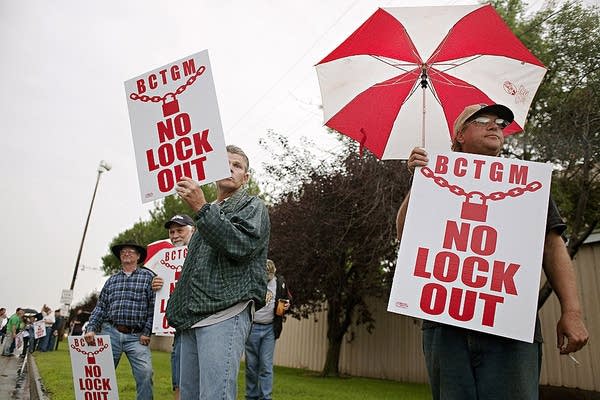After more failed talks, Crystal Sugar says 'window is closing'
Go Deeper.
Create an account or log in to save stories.
Like this?
Thanks for liking this story! We have added it to a list of your favorite stories.

In an ongoing dispute over health insurance costs and contract provisions designed to protect union worker job security, American Crystal Sugar and union officials remain at odds after a nearly six-month worker lockout.
Company officials in August barred about 1,300 workers from five sugar beet processing plants in the Red River Valley. In Minnesota, the company has operations in Moorhead, East Grand Forks and Crookston. Its plants in North Dakota are in Drayton and Hillsboro.
There are also sugar storage and shipping facilities in Chaska, Minn., and Mason City, Iowa.
For months, a key stumbling block has been proposed language that would allow the company to replace union workers with subcontractors. American Crystal workers also opposed a company proposal that they pay a greater share of health insurance costs.
Turn Up Your Support
MPR News helps you turn down the noise and build shared understanding. Turn up your support for this public resource and keep trusted journalism accessible to all.
Union President John Riskey said at a meeting Monday the union made concessions on health insurance and the use of outside contract workers. He declined to offer specifics.
But company Vice President Brian Ingulsrud said the union's offer didn't go far enough. As a result, prospects for ending the contract dispute appear to be fading as both sides make plans for a long struggle.
When the two sides met Monday with a federal mediator, each side blamed the other for the impasse — as they repeatedly have since August.
A key unresolved issue involves worker seniority, Ingulsrud said. The company wants more flexibility to transfer employees from one job to another.
"Their offer does not address seniority at all. It basically ignores that issue," he said. "And that is not going to get us a deal. We have to address that."
Union officials consider the proposed changes a ploy to weaken union job security. But Ingulsrud said the company wants the freedom to choose the most qualified workers.
CLOSING WINDOW OF OPPORTUNITY
He said the window for reaching an agreement is closing because the company's work cycle is reaching a crucial point.
American Crystal will finish processing last year's sugar beet crop this spring. Then the company's attention will turn to regular summer repairs at its five factories. Ingulsrud said that work requires skilled workers like mechanics and electricians.
"We need to plan for that work and we need to plan who's going to be here and who's not," he said. "If the union employees are not here we need to put in place contracts with outside contractors to make sure that work gets done. And we'll be committed to those contracts."
Once those agreements are signed American Crystal would have no incentive to bring union workers back until those contracts expire.
Ingulsrud said the company is still hiring locally to replace the temporary workers brought in from other states when the lockout started.
He said the company needs to decide if it will invest money to train those temporary workers who might become long-term employees and run the factories again in the fall.
American Crystal Sugar workers are represented by the Bakery, Confectionary, Tobacco Workers and Grain Millers Union, which is part of the AFL-CIO. The company negotiated its last contract with the union in 2004.
UNION BUSTING CHARGES
Riskey, the union local president, said American Crystal's moves are more evidence that the company aims to bust the union. American Crystal officials have said they won't rehire locked-out workers under any conditions except a contract settlement. Riskey said some union members have given up and retired or taken other jobs. Locked-out workers don't receive strike pay; some receive emergency funds, but Riskey said the remaining workers won't give in to company demands for contract concessions.
"They're committed to survive the best they can and fight this fight and continue on," he said. "I know there's lockouts that have gone on for years. Whether this one will or not we'll be there to support our members all the way through."
Riskey said the union is ending its support for the federal sugar program which uses import quotas and subsidies to ensure a profit for sugar beet farmers. In the past the union has lobbied Congress in support of the sugar program. But Riskey said American Crystal declared war on workers, so the union will fight back by trying to convince members of Congress to vote against sugar supports.
"We're going to have to fill them in on the sugar program and the farm bill and what Crystal Sugar is doing and their anti-worker tactics that undermine labor and industry and when the time comes for the sugar program to be voted on that they will be well educated and they will not support this," he said.
Ingulsrud said it's illogical for the union to lobby against a farm program that provides union members with good jobs.
Although the war of words continues, no new contract negotiations are scheduled.
Dear reader,
Your voice matters. And we want to hear it.
Will you help shape the future of Minnesota Public Radio by taking our short Listener Survey?
It only takes a few minutes, and your input helps us serve you better—whether it’s news, culture, or the conversations that matter most to Minnesotans.




